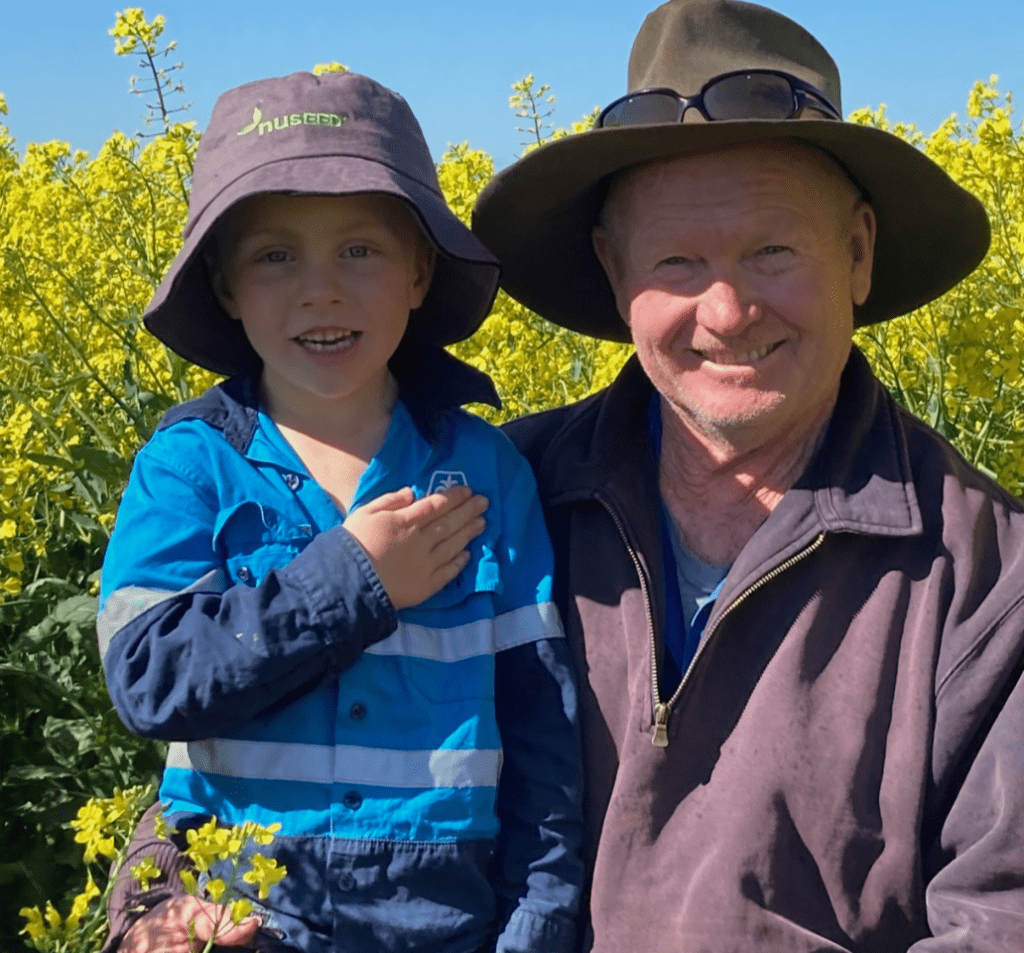
NSW Riverina farmer Ken Brain, Coleambally, and grandson Jaxon in a crop of Monola 420TT, which Mr Brain hopes will yield between $2.8 to 3t/ha.
AS AN early adopter, New South Wales Riverina cropper Ken Brain is one of a kind in his district where canola is the oilseed of choice.
The Coleambally farmer is the only one locally to be growing Monola, a form of canola.
He has been growing the speciality oil canola developed by Nuseed for the past 10 years, attracted by a premium of $100 a tonne above the price of canola while achieving similar yields.
This season he planted 220 hectares to Nuseed’s Monola 420TT variety and is trialling 10ha of the newly released variety 422TT, which he says “looks magnificent at the moment”. The variety will be available for planting commercially next season.
Monola 422TT is an open-pollinated variety and while it demonstrates hybrid-like vigour, it produces a seed genetically true to type and a plant similar to the parent.
The premium on offer is dependent on the crop meeting the required oil specifications at harvest and is there to offset any yield lag which in the past has been up to a 10 per cent. But new varieties being developed like 422TT are expected to at least address the former.
Price premiums
Before being convinced to try Monola by a local Elders agronomist, Mr Brain had previously grown canola for about 20 years.
He began by planting both canola and Monola side by side in two paddocks. Both yielded the same.
“We grew a little more next year and the following year I grew all Monola and no canola,” Mr Brain said.
For the past two years he has been paid a premium of $100/t over the canola price. This is on top of the current east coast price of $875/t (port) being paid for canola this season or $860-70/t delivered to the nominated receival site.
He only missed being paid a premium four years ago when the crop fell short of meeting the specified oil content.
Last year he achieved his best yield of 2.8 t/ha, a feat he hopes to repeat this season. In previous years he has averaged between 2.4-2.5 t/ha a year.
Delivery sites
In past seasons, Mr Brain has delivered to Numurkah but this year it will be to GrainCorp’s delivery site at Cosgrove near Dookie.
Those considering planting the crop are contracted with either GrainCorp or MSM Milling to grow and deliver it to them at the end of the season.
Because of the proximity of the delivery sites it is only feasible for western Victorian, central west and southern NSW growers to produce.
Canola traits
Monola shares similar agronomic traits as canola modified through selective breeding, which yields a cooking oil low in saturated fat.
It was developed in a Nuseed breeding program at Horsham, Victoria from canola modified by traditional plant breeding with no genetic engineering involved.
It bears a strong resemblance to canola with the added advantage of being well suited for use at high temperatures in the fast food-service industry, restaurants, hospitals and the like which are dominated by highly saturated oils and fats such as palm and tallow oil.
It is often delineated as being a high oleic, low linolenic acid oil giving it a lower level of saturated fatty acids, which limits oil absorption in cooking and makes it a healthier alternative which adds to its appeal.
Niche product
According to Wagga Wagga-based specialist oil operations manager for Nuseed, Eleanor Lee, while canola has become a market leader in margarines and bottled oils, its oil has insufficient oxidative stability for applications including frying.
Nuseed has aspirations to have 15,000ha planted to the 422TT variety in Victoria next season and 16,000ha in central western NSW.
Ms Lee said Monola remained a niche product until it could be demonstrated that Nuseed had a consistent product both agronomically and to take to the market.
Nuseed is banking on 422TT consistently achieving the right oil content profile specified when sown commercially next season.
“We really have been wanting to launch new varieties as quickly as we can to make the products obsolete that have not been meeting the oil quality.
“We’re relying on having some more good data from our paddock demonstrations to give growers more confidence to have that consistent performance.”
Star performer
MSM Milling procurement manager, James Dellow, Manildra, NSW, said up until last year Monola lagged in yield up against canola, which had been offset by paying a premium to encourage more growers to plant it.
Last year, however, he said it was a “star performer” in the area MSM Milling had contracted farmers growing it.
“This year a lot of guys have turned to it based on performance and the premium that is there.
If they can get two tonnes a ha some guys could achieve up to $1800/ha quite easily this year.”
Mr Dellow said the biggest Monola market for MSM Milling was the fast food outlets, KFC and Big Rooster as well as gaining some Asian customers in the last 12-18 months.
GrainCorp’s Sydney-based key account manager Jack Keeping said demand for Monola seed had been growing over the last couple of years.
GrainCorp, which has partnered with Nuseed for several years with its Monola program, has receival sites in north, central, and western Victoria to cater for growers from southern NSW to Victoria’s Wimmera and Western Districts.
Mr Keeping said to get growers to plant Monola, it had to provide a more compelling return than canola, which was why GrainCorp offered a premium of $100/t.
This year, he said, growers were likely to achieve an excellent gross margin with Monola.
Source: Nuseed

HAVE YOUR SAY